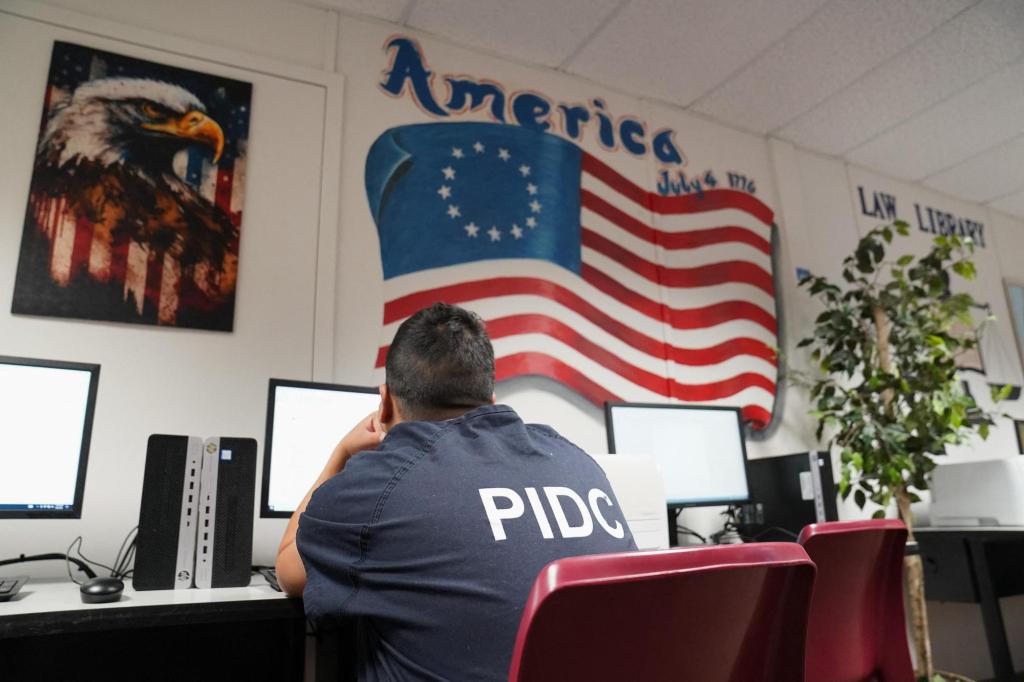Expansion of Private Immigration Detention Under the Trump Administration
By Amanda Hernández, Stateline.org
Overview of Recent Developments
The Trump administration is rapidly increasing the capacity for detaining unauthorized immigrants in the United States. This expansion largely hinges on the involvement of for-profit prisons, which have faced scrutiny for their treatment of detainees in the past.
Key Facility Reopenings
In a significant move, U.S. Immigration and Customs Enforcement (ICE) announced the reopening of Delaney Hall in Newark, New Jersey, a facility owned by the GEO Group. This addition will become the largest ICE detention center on the East Coast, with a capacity of around 1,000 individuals. The 15-year contract associated with this facility is estimated at $1 billion.
Moreover, CoreCivic is set to reopen the South Texas Family Residential Center, which can accommodate up to 2,400 detainees, including children, with a contract extending until at least March 2030.
The Context of Private Detention Growth
Private immigration detention centers have grown significantly during Trump’s tenure, revitalizing institutions that were previously criticized for their conditions. Around eight states are expected to see private facilities reopen, amidst a backdrop of long-standing allegations against the industry concerning inadequate care and oversight.
During a recent Border Security Expo, Todd Lyons, Acting ICE Director, expressed aspirations to make the deportation process as efficient as major corporations, indicating a shift towards treating immigration enforcement more like a commercial enterprise.
Financial Implications and Contracts
Both GEO Group and CoreCivic have reported a surge in business opportunities amid the expansion plans, anticipating greater demand for services, including electronic monitoring and transportation. GEO Group has allocated $70 million specifically to enhance their facilities in line with federal enforcement goals, while CoreCivic has received new contracts in multiple states including Nevada and Oklahoma.
The U.S. Department of Homeland Security is also in the process of soliciting bids for new contracts that could total up to $45 billion over two years, raising questions about the extent of privatization in immigration enforcement.
State Responses and Concerns
Responses to the expansion of private detention centers have varied by state. While some states like Illinois and New York have laws banning private prisons, these measures typically do not extend to federal detention facilities. Ongoing legislative efforts in Washington state aim to introduce state inspection of private immigration facilities, highlighting a growing demand for accountability.
Public sentiment remains a mixed bag, with some community leaders advocating for local detention facilities as safer alternatives for their communities, while others raise concerns about the historical abuses associated with such institutions.
Oversight Challenges
The lack of comprehensive oversight for private immigration detention centers poses significant challenges. Investigations have found lapses in standards and care, particularly in facilities operating under federal contracts. Reports suggest that nearly 90% of immigrants in ICE custody are housed in privately operated institutions, which are often exempt from stringent state regulations.
Furthermore, ICE contracts contain guaranteed minimizing provisions that have resulted in substantial fiscal waste, as the government pays for empty beds in these facilities.
Conclusion
The current trajectory of the U.S. immigration detention system under the Trump administration indicates an impending increase in reliance on private facilities for immigration enforcement. As the landscape evolves, the intersection of profit motives and the pursuit of humane treatment for detainees will remain a critical focal point for lawmakers and advocates alike.

